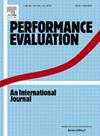异构歧视性处理器共享队列中的用户均衡
IF 0.8
4区 计算机科学
Q4 COMPUTER SCIENCE, HARDWARE & ARCHITECTURE
引用次数: 0
摘要
我们考虑了一个两类歧视性处理器共享队列的策略路由博弈,该队列具有加入优质类的额外成本。我们证明,根据系统的特定参数,各种均衡可以共存,包括排队系统对于均衡流量分割不遍历的均衡。我们还研究了服务器如何选择课程的优先级和向客户收取的费用,以使其收入最大化。然后我们研究收敛于特定均衡的学习策略。最后,研究了交通需求弹性对均衡解的影响。本文章由计算机程序翻译,如有差异,请以英文原文为准。
User equilibria in heterogeneous discriminatory processor sharing queues
We consider a strategic routing game for a two-class discriminatory processor-sharing queue with an additional cost for joining the premium class. We show that, depending on the specific parameters of the system, various equilibria can coexist, including equilibria where the queueing system is not ergodic for the equilibrium traffic split. We also investigate how the server can select the priority of the classes and the fees charged to the customers to maximise its revenue. We then investigate learning strategies that converge to particular equilibria. Finally, we study how the elasticity of the traffic demand affects the equilibrium solutions.
求助全文
通过发布文献求助,成功后即可免费获取论文全文。
去求助
来源期刊

Performance Evaluation
工程技术-计算机:理论方法
CiteScore
3.10
自引率
0.00%
发文量
20
审稿时长
24 days
期刊介绍:
Performance Evaluation functions as a leading journal in the area of modeling, measurement, and evaluation of performance aspects of computing and communication systems. As such, it aims to present a balanced and complete view of the entire Performance Evaluation profession. Hence, the journal is interested in papers that focus on one or more of the following dimensions:
-Define new performance evaluation tools, including measurement and monitoring tools as well as modeling and analytic techniques
-Provide new insights into the performance of computing and communication systems
-Introduce new application areas where performance evaluation tools can play an important role and creative new uses for performance evaluation tools.
More specifically, common application areas of interest include the performance of:
-Resource allocation and control methods and algorithms (e.g. routing and flow control in networks, bandwidth allocation, processor scheduling, memory management)
-System architecture, design and implementation
-Cognitive radio
-VANETs
-Social networks and media
-Energy efficient ICT
-Energy harvesting
-Data centers
-Data centric networks
-System reliability
-System tuning and capacity planning
-Wireless and sensor networks
-Autonomic and self-organizing systems
-Embedded systems
-Network science
 求助内容:
求助内容: 应助结果提醒方式:
应助结果提醒方式:


